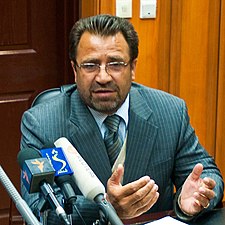Mohammad Gulab Mangal
| Gulab Mangal | |
|---|---|

Gulab Mangal speaking at the ISAF headquarters in February 2010
|
|
| Governor of Nangarhar | |
|
Assumed office 22 October 2016 |
|
| Preceded by | Salim Khan Kunduzi |
| Governor of Helmand | |
|
In office 22 March 2008 – 20 September 2012 |
|
| Preceded by | Assadullah Wafa |
| Succeeded by | Mohammad Naeem |
| Governor of Laghman | |
|
In office 2006–2008 |
|
| Preceded by | Shah Mahmood Safi |
| Succeeded by | Lutfullah Mashal |
| Governor of Paktika | |
|
In office 2004–2006 |
|
| Preceded by | Muhammad Ali Jalali |
| Succeeded by | Mohammad Akram Khpalwak |
| Personal details | |
| Born | 1958 Gardēz, Paktia Province, Afghanistan |
| Nationality | Afghanistan |
Gulab Mangal (Pashto: ګلاب منګل) (born 1958), is the former Governor of Helmand, Afghanistan, and the former Governor of Laghman and Paktika. He also served as head of the Committee that drafted Afghanistan's most recent Constitution. Mangal was considered an effective governor by both diplomats and military officials in Afghanistan.
Mangal was born in Laja Mangal, Paktia Province in Afghanistan, and belongs to the Mangal ethnic Pashtun tribe. He has a degree in literature from Kabul University.
A former member of the People’s Democratic Party of Afghanistan, Mangal served as a colonel in the Afghan army, and worked in the Ministries of Interior and Defence in the late 1970s, and later joined the insurrection fighting the Soviet invasion of Afghanistan. After the American led invasion in 2001, he was appointed a Regional Coordinator of the Constitutional Loya Jirga in Paktia.
Mangal served as governor of Paktika Province from March 2004 until March 2006, and then as governor of Laghman Province. On March 22, 2008, he was made the governor of Helmand Province, while former Interior Ministry spokesman Lutfullah Mashal replaced him in Laghman.
When appointed governor of Helmand, he was said to be “one of the most accomplished governors to have served Afghanistan since 2001”.The Washington Post attributes Mangal′s popularity in Helmand to his appointing competent district leaders and focusing on delivering basic services to the population, who also regard him as willing to stand up to the corrupt government in Kabul. Further, Mangal, whom the New York Times calls “ardently anti-opium”, succeeded in cutting back opium cultivation in Helmand by 33 percent in 2009. Mangal's subsidised wheat seed programme, giving an alternative to poppy crops, is reported to have reached 40,000 farmers.
...
Wikipedia
